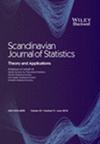Epistemic confidence in the observed confidence interval
IF 1
4区 数学
Q3 STATISTICS & PROBABILITY
引用次数: 1
Abstract
We define confidence to be epistemic if it applies to an observed confidence interval. Epistemic confidence is unavailable—or even denied—in orthodox frequentist inference, as the confidence level is understood to apply to the procedure. Yet there are obvious practical and psychological needs to think about the uncertainty in the observed interval. We extend the Dutch Book argument used in the classical Bayesian justification of subjective probability to a stronger market‐based version, which prevents external agents from exploiting unused information in any relevant subset. We previously showed that confidence is an extended likelihood, and the likelihood principle states that the likelihood contains all the information in the data, hence leaving no relevant subset. Intuitively, this implies that confidence associated with the full likelihood is protected from the Dutch Book, and hence is epistemic. Our goal is to validate this intuitive notion through theoretical backing and practical illustrations.观察到的置信区间中的认知置信度
本文章由计算机程序翻译,如有差异,请以英文原文为准。
求助全文
约1分钟内获得全文
求助全文
来源期刊

Scandinavian Journal of Statistics
数学-统计学与概率论
CiteScore
1.80
自引率
0.00%
发文量
61
审稿时长
6-12 weeks
期刊介绍:
The Scandinavian Journal of Statistics is internationally recognised as one of the leading statistical journals in the world. It was founded in 1974 by four Scandinavian statistical societies. Today more than eighty per cent of the manuscripts are submitted from outside Scandinavia.
It is an international journal devoted to reporting significant and innovative original contributions to statistical methodology, both theory and applications.
The journal specializes in statistical modelling showing particular appreciation of the underlying substantive research problems.
The emergence of specialized methods for analysing longitudinal and spatial data is just one example of an area of important methodological development in which the Scandinavian Journal of Statistics has a particular niche.
 求助内容:
求助内容: 应助结果提醒方式:
应助结果提醒方式:


